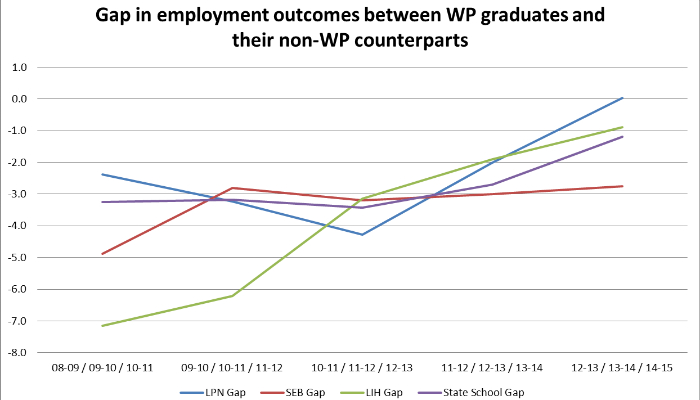Gaining a degree doesn’t necessarily level the playing field for all graduates when it comes to finding a job. The University of Manchester has been trying out a scheme to change that and get more students from disadvantaged backgrounds into better jobs after graduation. As Andrew Whitmore from the university careers service explains, it looks to be getting positive results.
Reports produced by the Social Mobility Commission and research entities such as the Bridge Group indicate that students from poorer backgrounds (known as ‘wider participation’ group students or WP) do not enter professional graduate level careers in the same proportions as those from better-off backgrounds.
The strategic plan for the University of Manchester states that it will “provide a superb higher education and learning experience to outstanding students, irrespective of their backgrounds, and will produce graduates distinguished around the world for their professional employability, leadership qualities and broad liberal education.”
“I was really worried about attending university before I came, as I was worried I would not fit in.”
Bethany, student
In 2013-14 the university investigated the picture for its own students from widening participation backgrounds and found similar results: there were significantly lower proportions of WP students entering “graduate jobs”. To be true to the strategic vision of the university, actions had to be taken and given that students from low income households made up 26% of our overall student numbers, it was strategically important to improve the destinations of this group. So what did we do?
Initially, a target was set and a strategy produced: to achieve a year on year increase in the percentage of WP students in positive employment destinations (that means a managerial or professional occupation or graduate-level further study) and to narrow the employability gap between WP and non-WP students.
First we had to ensure that we had the data and the capacity to measure different data sets. We recruited a data analyst to collect and analyse outcomes, with a large part of her role relating to our WP students and the 6-month student destination survey (DLHE).
Main problem: networking skills
We then looked at hurdles facing students from less well-off backgrounds. The main issue that we discovered was access to professional networks and the resulting lack of knowledge, experience and contacts. Changing this overnight was not going to be quick or easy. We decided on the following actions:
- To ensure that at least 33% of our 600 mentoring opportunities went to WP students.
- To work with alumni in cities around the world to provide short periods of work experience and cultural experiences (we call this programme Global Graduates). Our students have been to Singapore, Hong Kong, New York and many other cities. Almost all participants are from low-income households.
- Break the cycle of “can’t afford to build up work experience” by providing bursaries for students with greatest financial need.
- As most WP students were from the Manchester region, we set up local internships and prioritised those most in need.
- Allocating careers consultants to work with alumni and put on ‘meet the professionals’ events and confidence-building activities.
- Provide more specific information online including information on organisations targeting this group.
Outcome: employability gap has narrowed
Over the last five years the employment outcomes for all graduates have increased and the outcomes for students from most WP backgrounds have increased even more.

The gap in employability between graduates from low socio-economic backgrounds and higher socio-economic backgrounds has narrowed to just 0.5% in the latest published data.
- Graduates from state schools outperformed their independent school counterparts for the first time.
- Graduates from low-income households have also got much closer to those from better-off households.
We can’t categorically say that these actions have led to these improvements, but we have measured students who have participated in the new activity and have discovered that in all cases they have improved employment outcomes over those who haven’t taken part.
The team at Manchester is heartened that these activities seem to be having an impact and really enthusiastic about continuing this work.








